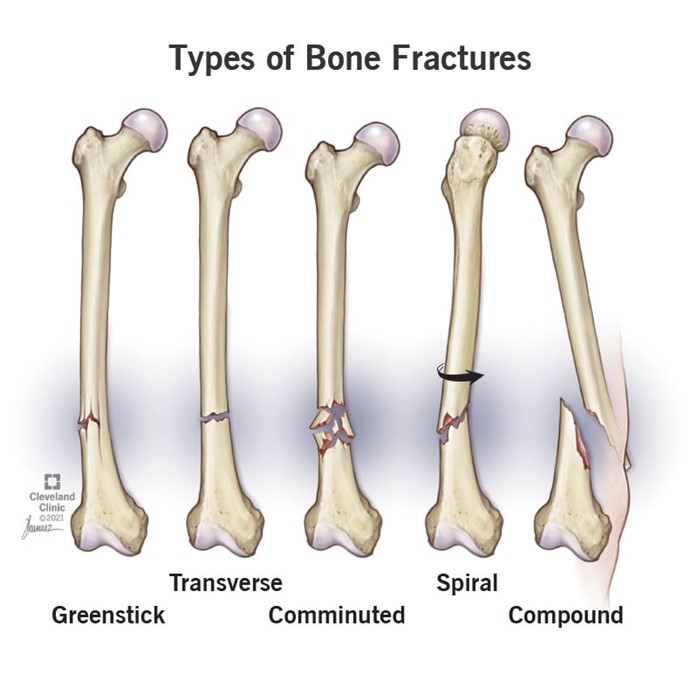A nurse is teaching an older adult client about vitamin D deficiency. The nurse should encourage the client to consume an adequate amount of vitamin D to prevent which of the following complications?
Dry eyes
Fractures
Infection
Swelling
The Correct Answer is B
Choice A reason: Dry eyes are not caused by vitamin D deficiency, but by other factors such as aging, medication, environmental conditions, or eye diseases. Vitamin D does not have a direct role in eye health or function.
Choice B reason: Fractures are caused by vitamin D deficiency, as vitamin D helps the body absorb calcium, which is essential for bone health and strength. Vitamin D deficiency can lead to osteoporosis, a condition in which the bones become brittle and prone to breaking.
Choice C reason: Infection is not caused by vitamin D deficiency, but by other factors such as exposure to pathogens, weakened immune system, or poor hygiene. Vitamin D may have some role in modulating immune responses, but it is not a primary factor in preventing infection.
Choice D reason: Swelling is not caused by vitamin D deficiency, but by other factors such as injury, inflammation, fluid retention, or allergic reaction. Vitamin D does not have a direct role in regulating fluid balance or reducing inflammation.

Nursing Test Bank
Naxlex Comprehensive Predictor Exams
Related Questions
Correct Answer is A
Explanation
Choice A reason: Scrambled eggs are a good food choice for a client who has difficulty chewing due to ill-fitting dentures because they are soft, moist, and easy to swallow. Scrambled eggs also provide protein, iron, and vitamin B12 for the client.
Choice B reason: Tuna fish is not a good food choice for a client who has difficulty chewing due to ill-fitting dentures because it may contain bones, skin, or scales that can cause discomfort or injury to the gums or mouth. Tuna fish should be avoided or checked for bones and skin before consuming.
Choice C reason: Roast beef is not a good food choice for a client who has difficulty chewing due to ill-fitting dentures because it is tough, dry, and hard to chew. Roast beef can cause pain, fatigue, or choking for the client who has ill-fitting dentures. Roast beef should be avoided or cut into very small pieces and moistened with gravy or sauce before consuming.
Choice D reason: Apple slices are not a good food choice for a client who has difficulty chewing due to ill-fitting dentures because they are crisp, firm, and sticky. Apple slices can dislodge or damage the dentures or cause irritation or infection to the gums or mouth. Apple slices should be avoided or cooked until soft and mashed before consuming.
Choice E reason: Dried fruit is not a good food choice for a client who has difficulty chewing due to ill-fitting dentures because they are chewy, sticky, and sugary. Dried fruit can adhere to the dentures or teeth and cause dental caries or gum disease. Dried fruit should be avoided or soaked in water until soft and cut into small pieces before consuming.
Correct Answer is D
Explanation
Choice A reason: Soaking fruits in water before peeling them is not a good practice for retaining nutrients because it can cause water-soluble vitamins, such as vitamin C and B-complex vitamins, to leach out into the water. It is better to wash fruits briefly under running water and peel them as thinly as possible.
Choice B reason: Cooking vegetables for the week and reheating them at each meal is not a good practice for retaining nutrients because it can cause nutrient losses due to exposure to heat, light, air, and water. It is better to cook vegetables as close to the time of consumption as possible and use minimal water and cooking time.
Choice C reason: Boiling vegetables on the stove until they are soft is not a good practice for retaining nutrients because it can cause significant nutrient losses due to high temperature and long cooking time. It is better to steam, microwave, or stir-fry vegetables until they are crisp-tender and retain their color and texture.
Choice D reason: Keeping ripe fruits refrigerated until eating them is a good practice for retaining nutrients because it can slow down the ripening process and prevent spoilage. Refrigeration can preserve the freshness, flavor, and nutritional value of fruits. However, some fruits, such as bananas, tomatoes, and avocados, should not be refrigerated because they can lose their quality and taste.
Whether you are a student looking to ace your exams or a practicing nurse seeking to enhance your expertise , our nursing education contents will empower you with the confidence and competence to make a difference in the lives of patients and become a respected leader in the healthcare field.
Visit Naxlex, invest in your future and unlock endless possibilities with our unparalleled nursing education contents today
Report Wrong Answer on the Current Question
Do you disagree with the answer? If yes, what is your expected answer? Explain.
Kindly be descriptive with the issue you are facing.
